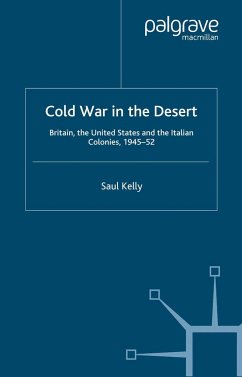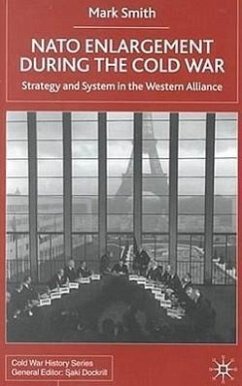
Effie G. H. Pedaliu
Gebundenes Buch
Britain, Italy and the Origins of the Cold War
Versandkostenfrei!
Versandfertig in 6-10 Tagen
Weitere Ausgaben:

PAYBACK Punkte
19 °P sammeln!





Effie G.H. Pedaliu analyzes the British Labour government's contribution to the postwar reconstruction of Italy. The book focuses on five areas: the punishment of war criminality; the reconstruction of the Italian armed forces; the Italian elections of April 1948 and Italy's institutional role in western security arrangements and on European integrative bodies. It reveals that British policy towards Italy was underpinned not only by power politics but also by moral and ideological considerations.
Effie G. H. Pedaliu is a Fellow at LSE IDEAS, UK, having previously held posts at LSE, KCL and UWE. She is the author of Britain, Italy and the Origins of the Cold War, (Palgrave Macmillan, 2003) and a co-editor of Britain in Global Affairs, Volume II, From Churchill to Blair, (Palgrave Macmillan, 2013) and also, The Foreign Office, Commerce and British Foreign Policy in the Twentieth Century, (Palgrave Macmillan 2017). Pedaliu is the co-editor with John W. Young of the Palgrave Macmillan book series, Security Conflict and Cooperation in the Contemporary World. She is a member of the peer review college of the Arts and Humanities Research Council and a co-convenor of the International History Seminar (IHR). The main themes of her work include transatlantic relations since 1945, the international history of the Cold War, American and British Cold War policyand strategy, European and Mediterranean security and politics, Human Rights and European Integration. Her articles have appeared in Diplomatic History, International History Review, Journal of Contemporary History, Cold War History and Diplomacy and Statecraft. She is a regular contributor to the Greek broadsheet Kathimerini on Sunday and a blogger on current affairs.
Produktdetails
- Cold War History
- Verlag: Palgrave Macmillan / Palgrave Macmillan UK / Springer Palgrave Macmillan
- Artikelnr. des Verlages: 978-0-333-97380-6
- 2003
- Seitenzahl: 252
- Erscheinungstermin: 23. Oktober 2003
- Englisch
- Abmessung: 222mm x 145mm x 19mm
- Gewicht: 409g
- ISBN-13: 9780333973806
- ISBN-10: 0333973801
- Artikelnr.: 21821144
Herstellerkennzeichnung
Springer-Verlag GmbH
Tiergartenstr. 17
69121 Heidelberg
ProductSafety@springernature.com
"Effie Pedaliu's new book does just this, and more, and is therefore to be heartily welcomed as a significant contribution to our understanding of this subject. ... The nature of the Anglo-American and Italian achievement in this regard has been ably analysed and highlighted in this book, which is a very welcome addition to our knowledge of the origins of the Cold War in Europe." (Saul Kelly, Diplomacy Statecraft, June, 2017)
"It is a very thoroughly researched monograph. The author has meticulously covered the government archives, researching the papers of several different departments in depth. ... An invaluable bibliography also draws together an impressive range of materials written in both English and Italian. In covering all this material, Pedaliu has performed a valuable service and this study deserves to become one of the standard works on this surprisingly neglected period in British foreign policy." (Richard Grayson, H-Net Reviews, h-net.org, August, 2005)
'Overall, this is a highly recommendable book. Far from being relevant solely to scholars interested in Italian history, it also offers interesting insights on the Attleegovernment's foreign policy and on the reconfiguration of Ango-American relations within the context of the Cold War.' - Ilaria Favretto, European History Quarterly
"It is a very thoroughly researched monograph. The author has meticulously covered the government archives, researching the papers of several different departments in depth. ... An invaluable bibliography also draws together an impressive range of materials written in both English and Italian. In covering all this material, Pedaliu has performed a valuable service and this study deserves to become one of the standard works on this surprisingly neglected period in British foreign policy." (Richard Grayson, H-Net Reviews, h-net.org, August, 2005)
'Overall, this is a highly recommendable book. Far from being relevant solely to scholars interested in Italian history, it also offers interesting insights on the Attleegovernment's foreign policy and on the reconfiguration of Ango-American relations within the context of the Cold War.' - Ilaria Favretto, European History Quarterly
Für dieses Produkt wurde noch keine Bewertung abgegeben. Wir würden uns sehr freuen, wenn du die erste Bewertung schreibst!
Eine Bewertung schreiben
Eine Bewertung schreiben
Andere Kunden interessierten sich für











